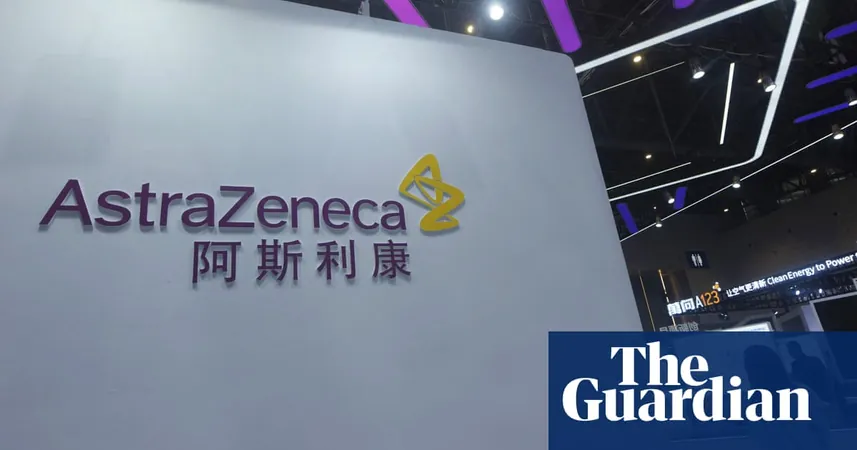
AstraZeneca Shares Plunge: Connections to Alleged Insurance Fraud and Underwhelming Drug Data
2024-11-05
Author: Yan
AstraZeneca, one of Britain's leading pharmaceutical giants, saw its shares plummet on Tuesday, wiping a staggering £14 billion off the company's market value. This dramatic decline follows reports suggesting that numerous senior executives within its China division may be embroiled in an insurance fraud scandal prominent in China's pharmaceutical landscape.
Adding to the pressure on AstraZeneca's stock, analysts from Deutsche Bank shared early data regarding the company's much-anticipated experimental weight loss pill, describing the results as "somewhat underwhelming." Consequently, they reaffirmed their "sell" rating on the shares, contributing to a decline of over 8% and bringing the market value down to approximately £156 billion.
The firm's troubles began last Wednesday when it was reported that Leon Wang, the president of AstraZeneca's China operations and also the executive vice-president for international markets, has stepped back amid an investigation by Chinese authorities. The company confirmed that Wang is "cooperating with an ongoing investigation," and operations in China are currently led by Michael Lai, the general manager.
According to the financial media outlet Yicai, multiple executives at AstraZeneca are under scrutiny by Chinese authorities, and the probe has reportedly expanded to include not only law enforcement but also the public security bureau and the supervisory commission.
In a statement regarding the investigations, an AstraZeneca spokesperson noted: "As a matter of policy, we do not comment on speculative media reports, including those related to ongoing investigations in China. If requested, we will fully cooperate with the Chinese authorities. We continue to deliver our life-changing medicines to patients in China, and our operations are ongoing."
In a shocking twist, it was revealed in September that five current and former employees of AstraZeneca had been detained by Chinese police regarding potential breaches involving data privacy and the importation of unlicensed medications. Reports indicate that the total number of detained personnel has now risen to as many as nine.
These detentions were aimed primarily at Chinese nationals marketing cancer drugs within AstraZeneca's oncology division, with suspicions raised over the importation of a liver cancer treatment drug that had not received approval for distribution within mainland China.
This extensive investigation, spearheaded by Shenzhen police, additionally probes the company's practices surrounding patient data collection and potential violations of China's stringent privacy laws.
China represents a crucial market for AstraZeneca, and the company has made significant investments in the region. Last year, it announced plans for a $450 million (£350 million) manufacturing facility and has engaged in licensing agreements with various Chinese firms. Earlier in the year, AstraZeneca also acquired Shanghai-based Gracell Biotechnologies, a company focused on developing cell therapies for cancer and autoimmune diseases, for a whopping $1.2 billion.
As these events unfold, the implications for AstraZeneca's operations in one of its most vital markets remain uncertain, prompting analysts and investors to reassess the future prospects of this pharmaceutical powerhouse. Will AstraZeneca weather this storm, or is this just the beginning of a more tumultuous chapter? Stay tuned.



 Brasil (PT)
Brasil (PT)
 Canada (EN)
Canada (EN)
 Chile (ES)
Chile (ES)
 España (ES)
España (ES)
 France (FR)
France (FR)
 Hong Kong (EN)
Hong Kong (EN)
 Italia (IT)
Italia (IT)
 日本 (JA)
日本 (JA)
 Magyarország (HU)
Magyarország (HU)
 Norge (NO)
Norge (NO)
 Polska (PL)
Polska (PL)
 Schweiz (DE)
Schweiz (DE)
 Singapore (EN)
Singapore (EN)
 Sverige (SV)
Sverige (SV)
 Suomi (FI)
Suomi (FI)
 Türkiye (TR)
Türkiye (TR)